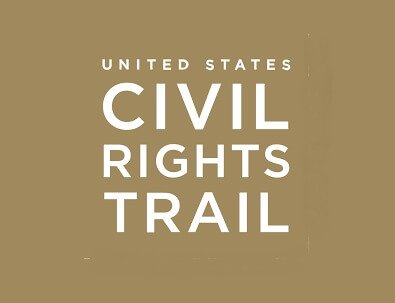Four new attractions and one new city have been added to the U.S. Civil Rights Trail (USCRT), officials announced Thursday. These destinations further enrich the trail experience and the story of the Civil Rights Movement, and it is fitting that they have been added during the nation’s celebration of Black History Month
The additions include the Muhammad Ali Center in Louisville
and the SEEK Museum in Russellville, Kentucky. The trail also added the Beale
Street Historic District and WDIA radio station, both in Memphis, Tennessee.
“We are delighted about the additions of the Muhammad Ali
Center, the SEEK Museum, Beale Street Historic District and WDIA to the U.S.
Civil Rights Trail,” said Lee Sentell, director of the Alabama Tourism
Department and chairman of the U.S. Civil Rights Trail Marketing Alliance. “We
know they will make incredible additions to the trail as a whole, which continues
to showcase how ‘what happened here changed the world.’”
The new sites were announced by the USCRT Marketing
Alliance, which is made up of 14 state tourism departments, Destination DC,
leaders from the National Park Service and historians. In 2018, the Marketing
Alliance formed and launched CivilRightsTrail.com, featuring approximately 120 sites between Topeka,
Kansas, and Washington, D.C., that were important to the Civil Rights Movement
of the 1950s and 1960s.
Most recently, the trail was recognized with gold for Best
Destination in a Region from the International Travel & Tourism Awards on
Nov. 5, 2019. It was also awarded the Mercury Marketing Award on Aug. 20, 2019,
for its marketing excellence. In the site’s second year, it achieved 1 million page
views.
About the New Sites
Historic Beale Street in Memphis, Tennessee, was established
in 1841 and is one of the most iconic streets in America. Around the time of
the Civil War, it became a thriving area for black commerce and culture. During the Civil Rights Movement, the
area was also where African-Americans came to entertain and be entertained,
shop, strategize and protest. When city sanitation workers decided to
strike in response to deplorable job conditions, they marched down Beale
Street, and Dr. Martin Luther King Jr. came to Memphis in support. The
demonstrations were a precursor to his assassination on April 4, 1968.
“The U.S. Civil Rights Trail is a vital ongoing project that
tells the stories of the brave men and women who stood up for equal rights,”
said Commissioner Mark Ezell, Tennessee Department of Tourist Development and
Secretary/Treasurer of the USCRT Marketing Alliance. “Tennessee is honored to
be part of keeping civil rights history alive. We are excited the state has two
new locations in Memphis on the trail – the Beale Street Historic District and WDIA
radio station.”
WDIA was the first radio station in the country programmed
entirely for the black community. The station went on air on June 7, 1947, from
studios on Union Avenue in downtown Memphis. Not only did the station feature
black radio personalities, but it also brought awareness to a relatively new
market of listeners. The station’s influence and popularity reached the
Mississippi Delta’s dense African-American population, and WDIA’s broadcasts
were heard from Missouri to the Gulf Coast, reaching 10 percent of the
African-American population in the United States.
The SEEK Museum in Russellville, Kentucky, recognizes the
work of journalist Alice Allison Dunnigan with a life-size bronze statue and an
exhibit about her achievements. The civil rights pioneer struggled against the
twin strikes of racism and sexism to become the first female African-American
admitted to the White House, Congressional and Supreme Court press corps. As
the Washington correspondent for the Associated Negro Press, she worked with
Congress to pass legislation that allowed her to obtain these press credentials
in 1947. She then reported on national affairs with a focus on civil rights and
other matters that were important to African-Americans. She also served on the
president’s Equal Employment Opportunity Commission and worked for several
years to enforce compliance of the Civil Rights Acts.
The Muhammad Ali Center in Louisville, Kentucky, is a
multicultural center with an award-winning museum that captures the inspiration
of Muhammad Ali’s legendary life. A visit to the center is not just an
experience but also a journey into the heart of a champion. Visitors to the
center will experience interactive and multimedia exhibits and discover Ali’s
six core principles: confidence, conviction, dedication, giving, respect and
spirituality. Fueled by these principles, Ali became the best athlete he could
be. He also garnered the strength and courage to stand up for what he believed
and provided inspiration to millions of people around the world, regardless of
ethnicity, religion, culture, gender or age. Located on Museum Row in the heart
of downtown Louisville, the Muhammad Ali Center is the only place in the world
dedicated to preserving and promoting Ali’s legacy.
About the U.S. Civil Rights Trail
The U.S. Civil Rights Trail is a collection of churches,
courthouses, schools, museums and other landmarks primarily in the Southern
states where activists challenged segregation in the 1950s and 1960s to advance
social justice. Famous sites include the Edmund Pettus Bridge in Selma,
Alabama; Little Rock Central High School in Arkansas; the Greensboro, North
Carolina, Woolworth’s where sit-ins began; the National Civil Rights Museum at
the Lorraine Motel in Memphis, Tennessee; and Dr. King’s birthplace in Atlanta,
to name a few. The people, locations and destinations included in the Civil
Rights Trail provide a way for families, travelers and educators to experience
history firsthand and tell the story of how “what happened here changed the
world.” For details about dozens of significant sites and to see interviews
with civil rights foot soldiers, visit CivilRightsTrail.com.
About the U.S. Civil Rights Trail Marketing Alliance
A project that began in 2015 to nominate a few civil rights
landmarks as potential UNESCO World Heritage Sites uncovered more than 100 National
Park Service sites, National Historic Landmarks, and other highly qualified and
recommended sites for consideration to UNESCO. By March 2017, it was obvious
that this first ever inventory of important civil rights locations was not
inclusive of all the destinations that could be part of a campaign to share the
story of freedom. And thus the concept of creating the U.S. Civil Rights Trail
was born. Thanks to the leadership of Alabama Tourism Director Lee Sentell, 14
state tourism offices – in Alabama, Arkansas, Florida, Georgia, Kansas,
Kentucky, Louisiana, Mississippi, Missouri, North Carolina, South Carolina,
Tennessee, Virginia, West Virginia – and the District of Columbia tourism group
joined together to create the U.S Civil Rights Trail Marketing Alliance, LLC, incorporated
in Atlanta in October 2017. The website, CivilRightsTrail.com, was promoted
through a licensing agreement with the state of Alabama. Travel South USA, a
nonprofit marketing organization, serves as the no-fee business office for the
Alliance, and the agency of record for the Alliance is Luckie & Company
with offices in Birmingham, Alabama, and Atlanta, Georgia.






